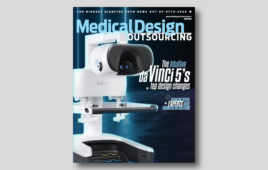
[Image from Unsplash]
This decline makes nurturing startups and entrepreneurship in the medtech field all the more critical. Incubator groups, accelerators and other strategies have popped up in the past few years. Some of those efforts are working to shift the expectations of the medtech industry to meet the changing environment of healthcare.
And it is by no means business as usual. (Check out 10 startups making a difference.)
“It used to be that medical device startups would develop a product by focusing on design, they’d get some IP with the product and it would be gobbled up by a big player,” explained Brett Naglreiter, who has started a consultancy firm to help develop and incubate medical device technologies.
That technology-first model doesn’t work anymore, said Naglreiter. That’s because the risks are higher; the chance of getting a potentially groundbreaking idea to market seems more remote. “You have greater emphasis on manufacturability, reimbursement, how the technology fits in the healthcare environment – all of these things need to be considered much earlier in the process than before, and startups need more breadth of expertise.”
Naglreiter notes that startups might feel pressure to “do it all” up front, something that will scare away those with limited budgets and limited experience. But he said it doesn’t need to be daunting. “You are still going to spend about 80% of resources on your core technology, but you also have to allocate 20% of resources to those other factors. You just have to get a sampling.”
Startups that will succeed will spend significant energy considering the costs of the device, and how the products will make healthcare better. Bryce Rutter, president and founder of Metaphase Design Group, put it like this: “We are past the days when a product does nothing more than feature a new color.”
Paul Grand, president of MedTech Innovator, agreed that innovative products need to have something extra. “It is not enough for new products to do just one thing.” Grand said the most promising technology looks at healthcare as an environment, employs smart data capture, increases sharing of knowledge, and contains costs, both in the short term and long term (e.g., through better patient outcomes).
MedTtech Innovator has partnered with AdvaMed to run a Shark Tank/American Idol style competition for startups in the medical technology field. Grand, who runs the accelerator and venture competition, says it helps to get promising technologies in front of AdvaMed members, who then can provide mentorship, funding, and partnership for some of the compelling entrepreneurs.
Rutter spoke about “Cinderella” startups: Well-funded, intriguing technologies that everyone wants to back – after they’ve proven that they’ve been able to mitigate the risks. As healthcare needs shift, it becomes clear that the startups that get noticed today are much more sophisticated, need to be much more well-funded, and – to be frank – a lot more mature than they used to be.
As such, some of Medical Design & Outsourcing’s choices for the hottest startup medical technologies have been around for a few years, and many have experienced entrepreneurs at the helm. Others feature new faces and are aiming to make a difference in new ways. We also tried to look for companies that may only have a prototype for a technology, those we hope to see more from in the coming years.
And so, with humility, here are Medical Design & Outsourcing’s most interesting startups for this year:





Heather, great insights on the changing needs for medtech start-ups. We were thrilled to see, Madorra, one of our collaborating partners make your top 10. Look forward to following your updates on this incredible startup space.
They are doing some important work. Thanks, Juan. I’m excited to see the latest crop of startups for 2018 as well.